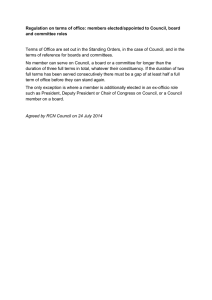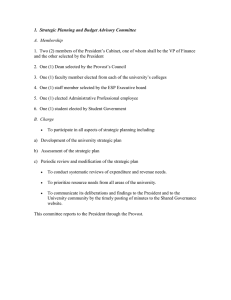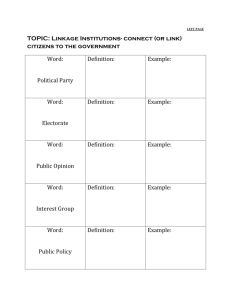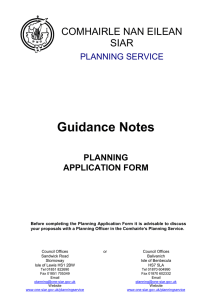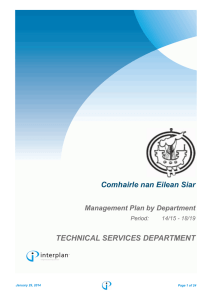WORKING GROUPS
advertisement
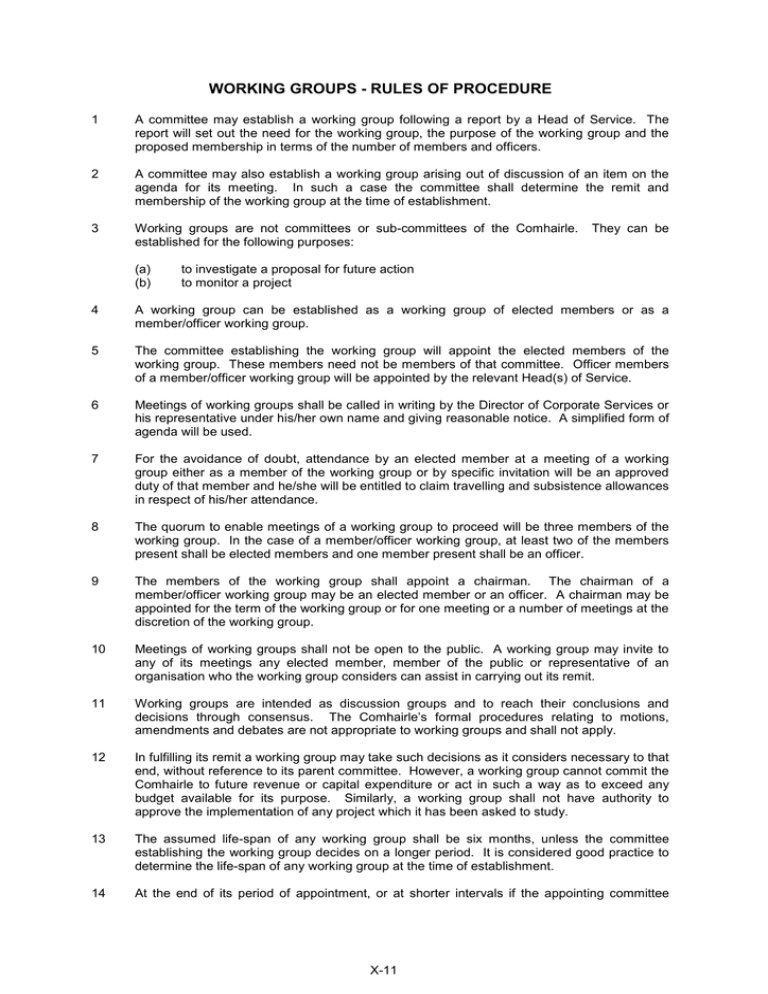
WORKING GROUPS - RULES OF PROCEDURE 1 A committee may establish a working group following a report by a Head of Service. The report will set out the need for the working group, the purpose of the working group and the proposed membership in terms of the number of members and officers. 2 A committee may also establish a working group arising out of discussion of an item on the agenda for its meeting. In such a case the committee shall determine the remit and membership of the working group at the time of establishment. 3 Working groups are not committees or sub-committees of the Comhairle. established for the following purposes: (a) (b) They can be to investigate a proposal for future action to monitor a project 4 A working group can be established as a working group of elected members or as a member/officer working group. 5 The committee establishing the working group will appoint the elected members of the working group. These members need not be members of that committee. Officer members of a member/officer working group will be appointed by the relevant Head(s) of Service. 6 Meetings of working groups shall be called in writing by the Director of Corporate Services or his representative under his/her own name and giving reasonable notice. A simplified form of agenda will be used. 7 For the avoidance of doubt, attendance by an elected member at a meeting of a working group either as a member of the working group or by specific invitation will be an approved duty of that member and he/she will be entitled to claim travelling and subsistence allowances in respect of his/her attendance. 8 The quorum to enable meetings of a working group to proceed will be three members of the working group. In the case of a member/officer working group, at least two of the members present shall be elected members and one member present shall be an officer. 9 The members of the working group shall appoint a chairman. The chairman of a member/officer working group may be an elected member or an officer. A chairman may be appointed for the term of the working group or for one meeting or a number of meetings at the discretion of the working group. 10 Meetings of working groups shall not be open to the public. A working group may invite to any of its meetings any elected member, member of the public or representative of an organisation who the working group considers can assist in carrying out its remit. 11 Working groups are intended as discussion groups and to reach their conclusions and decisions through consensus. The Comhairle’s formal procedures relating to motions, amendments and debates are not appropriate to working groups and shall not apply. 12 In fulfilling its remit a working group may take such decisions as it considers necessary to that end, without reference to its parent committee. However, a working group cannot commit the Comhairle to future revenue or capital expenditure or act in such a way as to exceed any budget available for its purpose. Similarly, a working group shall not have authority to approve the implementation of any project which it has been asked to study. 13 The assumed life-span of any working group shall be six months, unless the committee establishing the working group decides on a longer period. It is considered good practice to determine the life-span of any working group at the time of establishment. 14 At the end of its period of appointment, or at shorter intervals if the appointing committee X-11 requests, the working group shall present a report on its activities, including any recommendations for action. As a matter of good practice a working party should produce an interim report not later than half way through its period of appointment and must report any issue which affects its work at the earliest opportunity. Reports shall be prepared and submitted in the name of the working group and may be presented at the committee by an officer or an elected member. 15 A committee may extend the term of appointment of a working party if it will be advantageous to do so in order to ensure completion of a task. Similarly, a working group can request that its appointment be extended if it has become clear that it cannot complete its purpose within the time period allowed. Such a request will be made in a progress report to the appointing committee setting out the reasons for the extension to term. 16 After completion of its purpose and submission of its final report to the appointing committee, a working group shall be disestablished automatically. X-12
